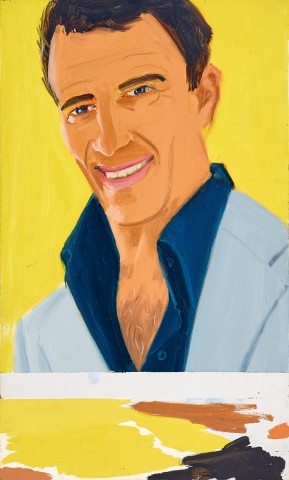SELF PORTRAIT, c.1977
ALEX KATZ
oil on composition board
48.0 x 28.5 cm
Robert Miller Gallery, New York (gallery stamp verso)
Ray Hughes, Sydney, acquired from the above mid 1980s
The Estate of Ray Hughes, Sydney
Self Portrait (Primary Title), 1977, oil on canvas, 182.88 × 152.4 cm, in the collection of Virginia Museum of Fine Arts, Richmond, Virginia, USA, object Number: 85.551
Cheerfully posing in front of a bright, canary-yellow background, contemporary painter Alex Katz presents himself to the world as a charismatic and suave anchor-man, a persona fashioned on the popular Latino television icon Ricardo Montalbán. This small and rare Self Portrait, c.1977 is an oil on Masonite study for Self Portrait (Primary Title), 1977, held in the permanent collection of the Virginia Museum of Fine Arts, in Richmond, Virginia, USA. This image was also reprised in a black and white aquatint, Self Portrait, 1978, which is held in the collections of many institutions across America, including the National Gallery of Art, Washington and the Carnegie Museum of Art, Pittsburgh. With an unbuttoned leisure suit displaying a hairy chest, Katz audaciously displays his machismo and challenges his artistic competitors and detractors. Unapologetic about the brashness of his artwork, Katz describes his process as ‘bringing the image to the surface of a picture, to intensify its frontal pressure so as to make it project more strongly or aggressively and immediately’. 1
Remaining steadfast in his resolve to distinguish himself from painterly fashions, Katz chose to portray the modern figure from within his immediate circle, against tides of dogmatic trends and theoretical battles in Modern painting. Over forty years of tireless artistic production, Katz has become renowned for a style that is truly unique (and has been described, tongue-in-cheek, as ‘Katzism’). With an ultra-cool detachment, his figures are distilled into flat and graphic shapes, often enlarged to fill enormous canvases. In Katz’s stylish world, everyone wears the latest clothes and glides hedonistically through life, utterly carefree. Light floods the canvas, frames are tightly cropped and colour is fresh from the tube. In this pared-back aesthetic reminiscent of commercial art, Katz’s portraits sought to portray new kind of American social realism, with the artist himself, his wife Ada and son Vincent as the prototypical all-American family, holding court in the High Society of the artworld. Katz is unashamed by his focus on the superficial, ‘I can’t think of anything more exciting than the surface of things. Just appearance.’ 2
For Katz, the existentialist rhetoric and unbridled gesturalism of his New York School colleagues was facile, and, predicting a crisis, he distanced himself as much as possible from sentimentality and pure formalism. He instead forged a new path in synthesising two divergent tendencies in painting: truth to the perception of the real world and truth to the two-dimensional reality of the picture plane. Moving towards a large-scale painting, Katz smooths out his brushwork and simplifies facial features into discrete flat areas, thinly painted with very little modular colour. The fluidity of his line, the animated quality of closely cropped canvases, and an exact recording of light compensates for Katz’s lack of detail and spatial depth. The considered combinations of adjacent colour fields, as evidenced by the lower section of this painting used by the artist as a trial colour palette, aligns Katz’s artistic practice more closely to that of Colour Field painters and Hard-Edge Abstractionists.
This Self Portrait is much warmer and looser than its related painting. Here, Katz has tried to record visual facts, particularly of light and colour, and attempts to define the economy of means that will enable him to create one of his most well-known self-portraits. Perhaps painted from nature, in a mirror, Katz has provided the minimum number of details sufficient to capture the sitter’s distinctive features, expression and gesture. In this case, the pink-lipped gleaming smile, the sparkling eyes, hairy chest and popped collar are enough to convey the archetype behind which Katz-the-artist hides.
1. The artist, cited in Sandler, I., Alex Katz: A Retrospective, Harry N. Abrams, New York, 1998, p. 19
2. The artist, cited in Horsfield, K., and Blumenthal, L., Profile: Alex Katz, New York, vol. 2, no. 1, Jan 1982, p. 9
LUCIE REEVES-SMITH
